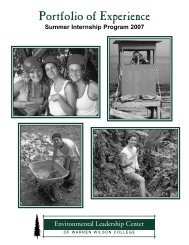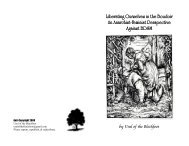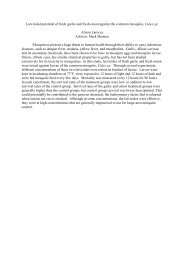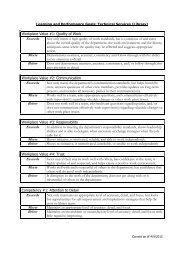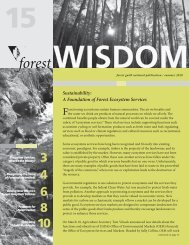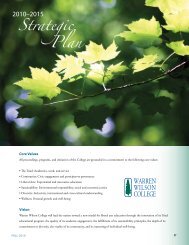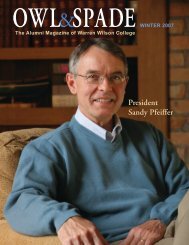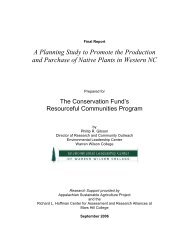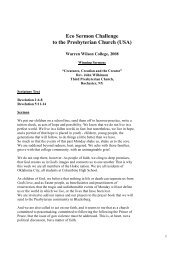here. - Warren Wilson College
here. - Warren Wilson College
here. - Warren Wilson College
Create successful ePaper yourself
Turn your PDF publications into a flip-book with our unique Google optimized e-Paper software.
Good science informs<br />
better policies<br />
Ecologists demonstrate how<br />
aggressive conservation strategies<br />
could help realize the vision of a<br />
more vital North Carolina<br />
While acknowledging the inevitability of change during<br />
the next century—including a much larger population<br />
and a changing climate—Horizon 2100 outlines possible<br />
alternative futures for North Carolina. It presents two<br />
starkly contrasting images: one, a society and economy<br />
that are fed by a naturally healthy and functional<br />
environment; the other, a society subjected to the<br />
tyranny of a diminished environment and an impoverished<br />
human habitat.<br />
The conservation strategies called for in Horizon 2100<br />
were introduced to forum audiences by two of the state’s<br />
most eminent ecologists: Dr. William Schlesinger, dean<br />
of the Nicholas School of the Environment and Earth<br />
Sciences at Duke University; and Dr. Charles (Pete)<br />
Peterson, professor of biology and marine ecology at<br />
the University of North Carolina-Chapel Hill.<br />
“Horizon 2100 asks the question: ‘What does North<br />
Carolina aspire to be in the<br />
future’” Dr. Schlesinger told<br />
the Raleigh audience.<br />
“What will be the quality of<br />
life experienced by our<br />
grandchildren What about<br />
the air they breathe, the<br />
water they drink, the natural<br />
areas they will visit, and the<br />
livelihoods that they might<br />
gain from the land and sea<br />
that surround them<br />
“A healthy natural environment<br />
provides ecosystem<br />
services—abundant clean<br />
water and air, fertile soils<br />
and productive forests—<br />
that benefit us all,” Dr.<br />
Schlesinger said. By protecting<br />
our watersheds, and<br />
conserving the landscape—<br />
urban and rural, parts<br />
human-dominated and parts<br />
natural —as a single, integrated<br />
and functional ecosystem,<br />
“future generations of North Carolinians can<br />
experience as healthy a natural environment as we<br />
enjoy today.”<br />
The Horizon 2100 plan has gained the endorsement<br />
of more than 130 of the state’s leading conservation<br />
scientists. But to attain this optimistic future, t<strong>here</strong><br />
exists perhaps only a 20-year window of opportunity<br />
to set our course. “Knowledge of ecological processes,<br />
present trends and projections provides the evidence<br />
that urges us to action,” Dr. Peterson told the audience<br />
in Greenville.<br />
The aggressive conservation advocated in Horizon 2100<br />
is more than “traditional preservationist ecology.” The<br />
plan seeks not to recreate the past or to simply preserve<br />
the present, but to rebuild and maintain the functional<br />
landscapes and watersheds that can naturally and costeffectively<br />
support human society.<br />
“Horizon 2100 asks us to take the long view,” Dr.<br />
Petersen said, “because from that perspective economic<br />
and environmental health coincide. In short time<br />
frames we are often deluded into thinking development<br />
that degrades the environment can be good for<br />
the economy; but when we consider the longer-term<br />
implications, we see that if the environment is degraded,<br />
then ultimately the economy will be comparably impoverished<br />
as well.”<br />
Ruth Shaw, President and CEO, Duke Power, interacts with Dean Bill Schlesinger, Duke<br />
University.<br />
Summer 2005 3



